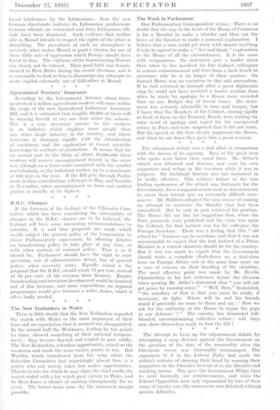The subsequent debate was a dull affair in comparison with
the drama of its opening. Most of the great men who spoke were below their usual form. Mr. Attlee's. attack was laboured and obscure, and even his own supporters took refuge in the tea-room while it was in progress. Sir Archibald Sinclair was too oratorical to be really effective. This relative failure of the two leading spokesmen of the attack was fortunate for the Government, for a rearguard action such as was necessary to cover their retreat was an extremely difficult man- oeuvre. Mr. Baldwin adopted the wise course of making no attempt to minimise the blunder that had been committed. But he only in part retrieved his position. The House did not like his suggestion that, when the Paris proposals were published and the crisis was upon the Cabinet, his first instinct was for his colleague the Foreign Secretary. • There was a feeling that this " old school tie " business can be overdone, and that it was not unreasonable to expect that the first instinct of a Prime Minister in a critical situation should be for his country. But it was too much to expect that the Government should make a complete climb-down on a first-class issue on Foreign Affairs and at the same time score on a vote of censure on their handling of the situation. The most effective point was made by Mr. Neville Chamberlain in his last sentences before the division When quoting Mr. Attlee's statement that "you will not get peace by running away." " Well, then," he insisted, the corollary of that is that you must be ready, if necessary, to fight. Where will he and his friends stand if presently we come to them and say : ' Now we ask for the authority of the House to repair the gaps in our defences ' ? " The country has demanded full- blooded, uncompromising collective action ; will they now show themselves ready to foot the bill ?


































 Previous page
Previous page